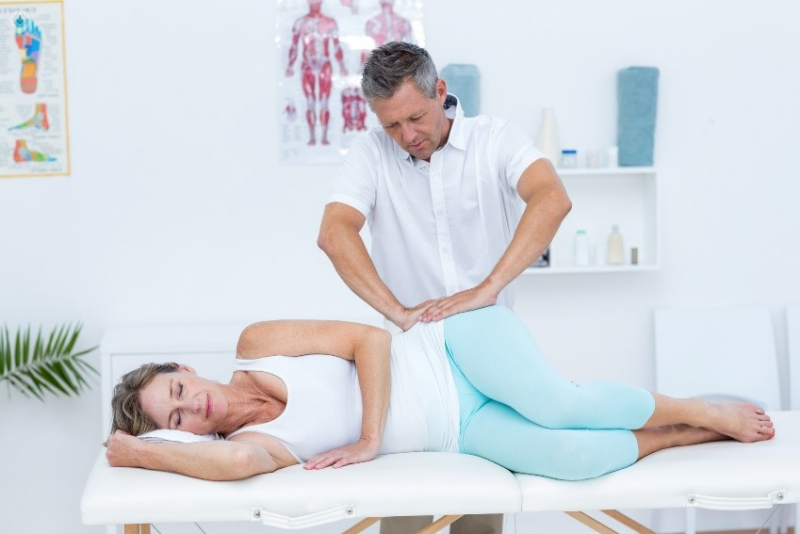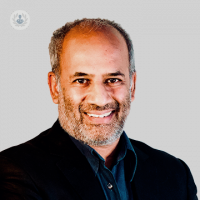How long does it take to recover after a hip arthroscopy?
Written by:The main aim of doctors and health specialists following any surgery is to ensure you heal quickly and get back to your regular daily activities. But when a person undergoes surgery, even a minimally invasive one like a hip arthroscopy, one of the common questions they ask is how long they will take to recover. London-based orthopaedic surgeon, Mr Pramod Achan, explains how long the recovery period typically is for hip arthroscopy and what the rehabilitation process is like.

How long does it take to recover?
Hip arthroscopy is done as a day case and the recovery is generally quick. After the surgery, the patient is given analgesia medication (painkillers) and crutches to go home with to provide support when walking around. The typical recovery period for most people is around six weeks, and after this it is imperative you start a course of physiotherapy to strengthen the muscles and get your hip back to full function.
What is the recovery period like?
Generally, for the swelling to go down, it can take up to three to four weeks. Weight-bearing precautions vary depending on the procedure but you’ll find the patient tends to abandon the crutches after around three weeks. Crutches are usually offered to patients to allow partial support if they feel comfortable to do so.
For my patients, I usually recommend that they start driving or commuting to work after six weeks, although some feel they are well enough to drive and go back to work before that. In any case, I always tell my patients to advise their employers that they could be off for six weeks in case they don’t feel fit enough to go back to work before that.
How long will I be immobile?
While you may be slower than usual getting around during your recovery, it’s very uncommon that a patient is completely immobile after hip arthroscopy. Very rarely we have to take a lot of bone from the hip which would mean spending a long time on crutches (around six weeks), however, this happens to less than five per cent of my patients. The remaining 95 per cent also use crutches but for a much shorter period and are fully weight-bearing.
How important is physiotherapy?
I highly recommend that patients undergo physiotherapy sessions after six weeks to start the process of hip and leg muscle strengthening. This will support your overall recovery and avoid complications such as stiffness developing in front of the hip. Returning to full function depends entirely on the rate at which you progress with your physiotherapy; a process that is vital in your rehabilitation.
Usually, patients that undergo hip arthroscopy are the ones that have had a failed course of physiotherapy beforehand, and while some succeed and improve their hip function after it, others unfortunately fail.
The main role of physiotherapy is to get you walking again and reducing the swelling around the hip. Your physiotherapist will guide you through the proper exercises but the main point here is not to push or force the hip too much as damaging the hip can drag out the healing process.
When is physiotherapy advised?
You must wait until the hip has healed before you start your physiotherapy sessions. After the first stage of recovery, which is around six weeks, you should then begin physiotherapy sessions to wait for everything to heal. As I said, if you begin physiotherapy before that while the hip is still healing, there is a risk of damaging the hip which will only make the healing process longer.
What activities can I continue and which should I avoid?
During the first two weeks, take things very easy. You can perform simple day-to-day tasks in the house such as walking up the stairs, going to the bathroom, showering, etc. but avoid anything too strenuous that puts pressure on your hip.
You will find that after these two weeks, you’ll likely be able to start walking normally again, although there may still be some stiffness in your hip. I also encourage you to return to driving whenever you can and feel comfortable to do so, providing you can perform an emergency stop.
All physical sports need to be completely stopped until you are fully weight-bearing. Your physiotherapist will advise you when it’s the right time.
Do you have any tips to help speed up recovery?
You should work very closely with your physiotherapist by getting a plan where you perform soft tissue mobilisation. I also recommend swimming and cycling, as they are low resistance exercises that get your joints moving again.
Mr Pramod Achan practices at the Princess Grace Hospital in London specialising in hip and knee surgery, arthroscopy and sports surgery. To make an appointment, visit Mr Achan's Top Doctors profile and check his availability.


